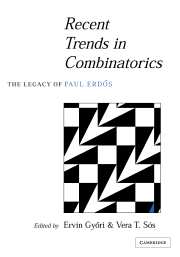Book contents
- Frontmatter
- Contents
- Preface
- Paul Erdős: The Man and the Mathematician (1913–1996)
- 1 A Selection of Problems and Results in Combinatorics
- 2 Combinatorial Nullstellensatz
- 3 Connectedness, Classes and Cycle Index
- 4 A Tutte Polynomial for Coloured Graphs
- 5 Notes on Sum-Free and Related Sets
- 6 Geometrical Bijections in Discrete Lattices
- 7 On Random Intersection Graphs: The Subgraph Problem
- 8 The Blow-up Lemma
- 9 The Homomorphism Structure of Classes of Graphs
- 10 Problem Collection of the DIMANET Mátraháza Workshop, 22–28 October 1995
4 - A Tutte Polynomial for Coloured Graphs
Published online by Cambridge University Press: 03 February 2010
- Frontmatter
- Contents
- Preface
- Paul Erdős: The Man and the Mathematician (1913–1996)
- 1 A Selection of Problems and Results in Combinatorics
- 2 Combinatorial Nullstellensatz
- 3 Connectedness, Classes and Cycle Index
- 4 A Tutte Polynomial for Coloured Graphs
- 5 Notes on Sum-Free and Related Sets
- 6 Geometrical Bijections in Discrete Lattices
- 7 On Random Intersection Graphs: The Subgraph Problem
- 8 The Blow-up Lemma
- 9 The Homomorphism Structure of Classes of Graphs
- 10 Problem Collection of the DIMANET Mátraháza Workshop, 22–28 October 1995
Summary
We define a polynomial W on graphs with colours on the edges, by generalizing the spanning tree expansion of the Tutte polynomial as far as possible: we give necessary and sufficient conditions on the edge weights for this expansion not to depend on the order used. We give a contraction-deletion formula for W analogous to that for the Tutte polynomial, and show that any coloured graph invariant satisfying such a formula can be obtained from W. In particular, we show that generalizations of the Tutte polynomial obtained from its rank generating function formulation, or from a random cluster model, can be obtained from W. Finally, we find the most general conditions under which W gives rise to a link invariant, and give as examples the one-variable Jones polynomial, and an invariant taking values in ℝ/22ℝ.
Introduction
Basic definitions
Throughout this paper, we shall consider the set of finite multigraphs, with loops allowed. Usually, we shall call an element of a graph, but sometimes we shall write multigraph for emphasis.
The Tutte polynomial, or dichrornate of [34], is an isomorphism-invariant function which arises in many different ways. We shall consider four different definitions of the Tutte polynomial.
The first definition, due to Tutte [34], is based on a spanning tree expansion. We take an order ø on E(G), and, for each spanning tree S of G, use ø and S to classify the edges of G into four types. We then assign a weight to each edge, depending on its type, and multiply these weights to find the weight of S.
- Type
- Chapter
- Information
- Recent Trends in CombinatoricsThe Legacy of Paul Erdős, pp. 45 - 94Publisher: Cambridge University PressPrint publication year: 2001



